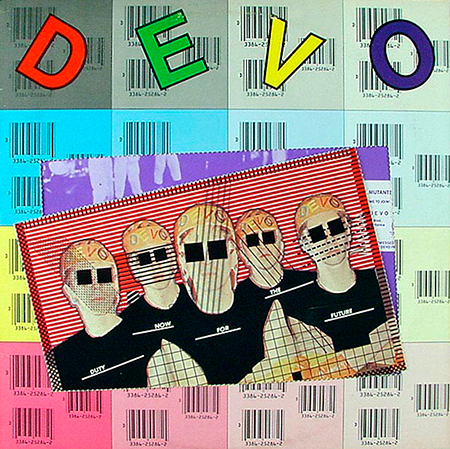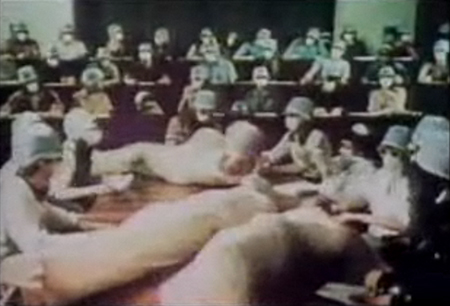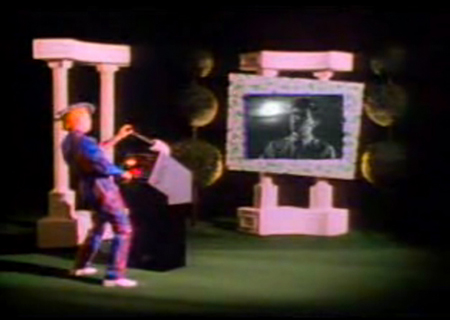
Image: DEVO, Duty Now for the Future - album artwork, 1979
But the whole discourse of noise-as-threat is bankrupt, positively inimical to the remnants of power that still cling to noise. Forget subversion. The point is self-subversion, overthrowing the power structure in your own head. The enemy is the mind's tendency to systematize, sew up experience, place a distance between itself and immediacy... The goal is OBLIVION.1 - Simon Reynolds, "Noise"
Replace the word OBLIVION with DE-EVOLUTION and you have encapsulated the essence of the strangest art-music project that ever emerged from Akron, Ohio. While a quintet of jerky ectomorphs in hazmat suits (seemingly) singing about sadomasochism breaching the Billboard Top 20 in 1980 seemed unlikely, the legacy of DEVO is fraught with such contradiction. Formed in 1973, DEVO began as a polemical performance project, became a major buzz band and then crumbled under the weight of the attention they had cultivated. Outside of influencing a generation of musicians and artists, a surface reading would suggest the band only registered a few blips on the broader pop culture radar—"Whip It", their pioneering music video work and a legendary Saturday Night Live performance—but tracing the dramatic arc of DEVO reveals a fascinating back story. While the group might be most easily read in relation to their 1970s Ohio peers Pere Ubu, The Dead Boys or Chi-Pig, more enduring points of reference may be found in the deadpan, dour and decidedly humorless synthpop of Telex, Gary Numan and Kraftwerk. Comparisons notwithstanding, DEVO defied categorization and their creative exploration of emerging technology, hermetic logic and contentious relationship with the mass market make them quite relevant to new media artists—they're just the band you want!
So, in celebration of homebrew science fiction, multimedia r&d and a profound cynicism regarding human nature, the following series of vignettes have been drafted to chart the circuitous mythology of DEVO. A critical listener might dismiss the band as a kitschy counterpoint to Reaganism, or worse yet, a 1980s footnote. However, careful consideration of DEVO's legacy reveals a morbid obsession with the decay of technology and an uncanny aptitude for the graphic dissection of pop culture. In the DEVO universe, there is no distinction between the prison colony and the shopping mall, suburbia is a blighted landscape of genetic defects and "space junk" rains down from the heavens. There is an order to this metamorphosis in the Midwest, attentive listening will reveal the pulse of a prescient rhythm section and a melodic snarl that is simply too odd to neatly file away in the standard punk, post-punk or new wave historical dustbins.
Video: DEVO perform "Smart Patrol/Mr. DNA" at Max's Kansas City, July 8th 1977.
Mythology as DIY enterprise: In November 1977, David Bowie walked onstage at Max's Kansas City in Manhattan and introduced DEVO as "the band of the future." This was a somewhat ironic description considering that DEVO had dedicated the better part of the last decade to assembling a narrative for the band based off not only cultural but evolutionary regression. The fruit of the band's labor was De-Evolution, an assemblage of crank sci-fi that combined elements from a 1924 puritan anti-evolution tract, a 1944 issue of Wonder Woman (that prominently featured an evolution machine), Oscar Kiss Maerth's 1971 pseudoscience treatise The Beginning Was the End and a 1933 film adaptation of H.G. Wells' The Island of Dr. Moreau. A sequence in the latter reference would inspire the infamous "Are we not men?—we are DEVO" call and response sequence from "Jocko Homo". The lyrics of the groups' first album, Q: Are We Not Men? A: We Are Devo! (1978) chronicled America as a mutant nation of crass commercialism fueled by hypocrisy, mundane ritual and sexual frustration. Perhaps founding member Bob Lewis stated the early goals of the band most lucidly in "Readers vs. Breeders," a manifesto he wrote for the LA Staff in 1972:
So it is that the Devo-tees believe that only in a reaffirmation of the organic impulse, and the subsequent realization of the basic physiological facts which are the functioning components of man's destiny-cluster can the horror of cybernetic man be avoided.2
So we might summarize the modus operandi of DEVO in this era as a celebration of the spasm, an outlet through which to snap "those who should know but don't, and those who don't know but should"3 into awareness. However, manifesto writing and junk science were not what got this collective on the path towards quasi-stardom. The genesis of DEVO can be traced to two key events, the politically and artistically charged milieu of Kent State between 1966-1974 and their first film project, The Truth about De-Evolution.
Video: Sextet DEVO at the Kent State Creative Arts Festival, 1973
The majority of writing on DEVO positions the civil unrest surrounding the 1970 Kent state shootings as a "ground zero" for their political and artistic awakening. Make no mistake, this event irrevocably affected the outlook of the original members. Bassist Jerry Casale witnessed the shooting of Allison Krause by the Ohio National Guard during the Kent State shootings. What is less documented than this political turmoil is the cultural renaissance that was taking place at Kent State before and after the shootings. At the time, a steady stream of baby boomers were moving to Ohio resulting in the university increasing in population by 250% within a few years—this growth was accompanied by an influx of young professors4. Amongst these scholars was poetry critic Robert Bertholf, who encouraged students Bob Lewis and Jerry Casale to play at the Kent State Creative Arts festival in 1973. Lewis and Casale were joined by Fred Weber, Rod Reisman, Bob Casale and Mark Mothersbaugh (manning the minimoog, wearing the chimp mask in the above video). Lab coats, surreal agitprop theatrics and a confrontational attitude towards the audience—the seeds were planted in this first concert.
It took a while before DEVO came close to resembling a "band" but the group chipped away at songwriting and honed their live performance skills at the second edition of the Creative Arts Festival in 1974. The following year, the group scored choice gigs at the Kent premier of John Waters' Pink Flamingos and a Cleveland Halloween event featuring Sun Ra (DEVO opened and cleared the room).
 Image: The Truth About De-Evolution (still), 1974
Image: The Truth About De-Evolution (still), 1974
Within the same time frame that these early performances were taking place, the members of DEVO were busy collaborating with fledgling filmmaker Chuck Statler (a peer from Kent State) to shoot their first film. The Truth About De-Evolution showcased their anthem "Jocko Homo" and a de-evolved version of "Secret Agent Man" within a surreal abstraction of the Midwest. Shot on location in a Goodyear factory, the Governance chambers in the Kent State student center, JB's (a nightspot), the "president's room" in a local McDonald's and crowned with an opening shot of a gaudy patriotic mural (reading "Shine on America"), the dystopian imagery is inspired and chilling. The "Jocko Homo" segment is a ghastly meditation on the body in which what seems to be a scientific congress erupts into a riot—complete with thrashing cocooned larvae and sickly cinematography—the sequence could make a young David Cronenberg squirm. The $2,000 film, with dead-simple static shots and a cast of friends and family won the "best short film" award at the 1976 Ann Arbor Film Festival and immediately became a fixture at DEVO shows. Years later, Mark Mothersbaugh reminisced: "There was no such thing as MTV in the mid-70s... so we would just string a sheet up and show the film in front of us. Then we'd pull it down and play a set" with the net effect being that the video "perfectly programmed" the audience for "celebrating the downward spiral".5 The Truth About De-Evolution began showing across the international festival circuit and quickly developed a cult following. Three decades later director Chuck Statler would speculate that the mythology and buzz around the film sparked a record label bidding war over DEVO that preceded the release of their first full-length in 1978.6
 Image: "Time Out For Fun" (still), 1982
Image: "Time Out For Fun" (still), 1982
Rock Band - r&d edition: Things moved very quickly for DEVO from 1978 onwards. Having undergone personnel changes the group was settling into their "classic" line-up that would remain in place through 1985. The band had evolved into a well-oiled gigging machine and was enjoying a new found celebrity geek chic status. DEVO released five albums between 1978 and 1982 and video was integral to their artistic development. To put things in perspective regarding how far ahead of the curve DEVO was with their investment in the music video as a medium, MTV launched in the summer of 1981 with a pool of about 100 videos7 and DEVO would shoot their tenth video that year. The success of "Whip It" ensured the band was a fixture in the early days of the cable network and DEVO was in such heavy rotation that they filmed MTV station IDs.
 Image: "Beautiful World" (still), 1981
Image: "Beautiful World" (still), 1981
Obviously none of DEVO's commercial videos were as outright weird as The Truth About De-Evolution, but given the size of the audience, much of their material was surprisingly subversive. The video for "Whip It" was a super-saturated critique of "cowboy culture" at the dawn of the Reagan years and "Beautiful World" featured Booji Boy at the helm of a archaic video mixer with which he cycles through an inventory of 20th century archival footage. Much like the lyrics, the song seems upbeat and poppy at first but the tone gradually shifts. The clips transition from blooming flowers, dancing women and scenes of idyllic leisure to a final sequence that stitches together trench warfare, Klansmen, vapid counterculture, race riots, a starving child and the explosion of a nuclear device. The video may not have been the "anti-capitalist science-fiction movie" that Jerry Casale had always dreamed of making8 but it epitomized the glossier (increasingly synthesizer-based) pop with unsettling undercurrents that DEVO had begun gravitating towards by their third album. This new sound was seamlessly translated into a sharp, uniform graphic language in the videos for three singles from Oh, No! It's Devo (1982) - "Time Out For Fun", "Peek-A-Boo!" and "That's Good" - that collectively considered the possibilities afforded by Chroma key and early 3D graphics.
In addition to video, DEVO was involved with the following media projects:
--- 3-DEVO, a rear-projection-based system for synchronized AV performance whereby the band played in front of, and interacted with the video content from Oh, No! It's Devo. The first performance was plagued by latency issues and resulted in decidedly un-synced audio and video with the band left confused and floundering in front of a full house and pay-per-view audience. Simon Reynolds described the irony of this debacle as DEVO, themselves a "parody of regimentation" had now became the real thing"9
--- Along with engineer David Smith, Jim Mothersbaugh (the "electronic percussionist" of the original DEVO lineup) worked at Roland throughout the 1980s developing MIDI technology.
--- 1987 saw the release of the E-Z Listening Disc - a brilliant compilation of Muzak versions of various titles from DEVO's back catalog. Lounge versions of classics like "Swelling, Itching Brain" and "Come Back Jonee" are simultaneously jaunty, bland and repugnant.
--- A 1995 foray into game development saw Devo Presents Adventures of the Smart Patrol, a Myst era point-and-click adventure title released to harsh criticism. One critic lamented "reaching the end is mercilessly impossible" and another described the game as "so hermetic... smugly wrapped up in its little world." Playability and interface griping aside, DEVO had developed a game several years before other bands would even begin licensing songs for use within the game industry.
Video: "Devo Corporate Anthem" from Duty Now for the Future, 1979
I find their 'philosophy', i.e. what lies underneath the surface devolution material, to be vacuous, populist and cynical to a repulsive and unnecessary degree.10 - David Thomas (Pere Ubu)
If you are going to fail, fail big: DEVO's luck with major labels (Warner Brothers represented them domestically) almost seemed doomed from the start. When the group produced a minor hit with "Whip It" the pressure was on—the label declared that "they must repeat" and DEVO simply couldn't. While the band was able to gain some traction due to the new wave phenomenon, they were by no means a perfect fit for the expectations of a mass audience. Too weird to pass off as synthpop and too stiff to please the post-punk crowd the band seemed to have manufactured themselves with built in obsolescence. Perhaps DEVO, in accordance with the Brian Wilson and Tony Asher song, simply weren't made for their time. Really, what band of the era would have better benefited from consumers receptive to independent labels or self-distribution?
DEVO's prospects for commercial success completely fizzled with the release of the unremarkable Shout in 1984. The album did not receive a warm critical reception and was a financial dud. Warner Brothers promptly dropped the band and percussionist Alan Myers (aka the human metronome) moved on to other projects. The group recorded albums in 1988 and 1990 but have been largely inactive for the last 25 years, only recently reactivating, touring and returning to the studio. Regardless of commercial success or longevity, DEVO made a sizable impression on the music industry and echoes of their irreverence can be recognized across the entire aural spectrum. DEVO would eventually be cited as a key influence by alt-icons like Trent Reznor and the late Kurt Cobain, their aesthetic and sound design is foundational to retro-outfits like Ladytron but most interestingly, traces of their post-industrial weirdness occasionally bubble up in unlikely (equally obtuse) places like the "operating theatre" of Dr. Octagon or the eugenics-obsessed electro of Dopplereffekt.
In 2001, Terre Thaemlitz described the lead New Traditionalists (1981) single "Through Being Cool" as an operating manual for "becoming a prick in the ears of all suburban robots that monitor reality."11 This is where DEVO thrived: in their purest moments they acted as kind of an incongruity contagion, quite literally "out of sync" with consensus reality—or, by their own description, "a musical laxative for a constipated society." DEVO carefully crafted each and every nuance of their identity and exemplified how even a pop band can function as tactical media practitioners—simultaneously submitting to and resisting the machinations of the music industry. Given this media savvy, it isn't at all surprising that DEVO largely mutated into various advertising, film scoring and video production ventures. So, as DEVO gears up for a "career victory lap" to celebrate the rerelease of their first two albums, you can't really fault them for the inevitable clichéd reunion tour—three decades ago they hollered that they must repeat.
1. Reynolds, Simon. "Noise" in Audio Culture: Readings in Modern Music. Cox, Christoph. Daniel Warner (eds). New York: Continuum, 2004. Pg. 57
2. Lewis, Bob. "Readers vs. Breeders: Didactical Works re De-Evolution" published in LA Staff in 1972.
3. ibid
4. Lewis, Bob "Some thoughts on Devo: the first Postmodern Band". Pg. 2.
5. Mark Mothersbaugh quoted in Dellinger, Jade. David Giffels. Are We Not Men? We Are Devo? London: SAF Publishing, 2003. Pg. 114.
6 See Wollinsky, David. "Interview: Chuck Statler" in A.V. Chicago. 2007.
7. Dellinger, Jade. David Giffels. Are We Not Men? We Are Devo? London: SAF Publishing, 2003. Pg. 189.
8. Reynolds, Simon. "Uncontrollable Urge" in Rip It Up and Start Again. London: Faber and Faber, 2005. Pg. 41.
9. ibid Pg. 49.
10. Quoted in Dellinger, Jade. David Giffels. Are We Not Men? We Are Devo? London: SAF Publishing, 2003. Pg. 105.
11. Thaemlitz released an album of piano interpretations of DEVO tracks on Mille Plateaux in 2001. The project was accompanied by extensive, at times quasi-autobiographical liner notes that feature a range of aesthetic and cultural commentary.
Greg J. Smith is a Toronto-based designer with an active interest in the intersection of space and media. He is co-editor of the digital arts publication Vague Terrain and blogs at Serial Consign.


yes oh yes … move forward, get ahead, and give the past a slip
I enjoyed this very much. Thanks. I can't say I disagree with David Thomas's assessment really, but I have always thought that "devolution" was not meant as a cohesive critical concept, but more as Devo's tongue-in-cheek contribution to what they felt was a disintegrating society. Plus, they rocked.
Thank you very much for an excellent and enjoyable article - I am biased towards this kind of stuff anyway. Also, I have been dj'ing again playing punk, new wave, electro, no wave etc under the name of RE:ROOT.
It has been tremendous fun and a re-earthing, reconnecting to a creativity which quite honestly seems to reach more deeply than much of the art I see today, but not all of it of course ;-)
wishing you well.
marc
@Chris Burke
I think if Bob Lewis had remained in the band, or perhaps DEVO focused more on pursuing film than music we might have seen a more critical agenda. Perhaps the band doesn't have the legacy they might have been destined for, but they have a legacy nonetheless.
@marc
I'm with you!
If you think Kraftwerk and Telex were unironic and humorless in their music, you are doing it wrong. Maybe one could get such an impression from the quite arbitrary English translations of their songs.
Hi Dragan, I only think Kraftwerk are humorless. Telex are hi-larious.
"bABYLON joHN" @ your service! Yes well maybe I wasted 5 years? 1995-2001-05 I don,t think so, check out my post "Newport Beach 2010 film festival. I see how this works now,it's all about exposure. I've been living as a recluse not participating in the comsumer based petro-chemical age as much as possible. IT is not practical, I need Money? ARAB OIL PRICING economic oppression. My punk rock Comedy Television show "THE DESTRUCTIVE IMPULSE SHOW" channel 13 Pegasys TV Ithaca New York TIME WARNER CABLE (5 years) Someone needs to contact me, although I'm not quite sure who? SPONSORS? corporates? I still have the studio VCR originals. Where are you arseholes with ALL the money? Just how and why shold I kiss your arse? Money sucks, but I can suck it up a little, I guess? Brown-nosing schmoozing kissing arse? If thats what it takes. I'll fake it untill I make it. Those day jobs, well I guess I cannot quit afterall? THE ANSWER another disscussion post. Would you know a genius if he poked you in the eye?…..( just laugh, it's all you can do and your best choice) contact me you ding-bats! "bABYLon joHN" OVER and OUT! PEACE? iLLUMINATi NEW WORLD ORDER FREEMASONRY fundamentalist religious gooble-dee-guk HO-made PIE! Peace? In or Out?
NoDragan, I am not agree with you actually both Kraftwerk and Telex were unique.